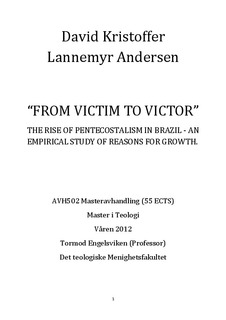| dc.description.abstract | The quest of the thesis was set out in the introduction and formulated through the main question of research: What are the reasons for Pentecostal growth in Brazil?
This theme has been shed light upon from various perspectives.
To summarise, my sources of insights have been: 1) Existing theories on the Pentecostal growth. 2) Empirical data
The prevailing theories of Pentecostal growth can be placed in three groups:
Deprivation theories tend to focus more on the demand side when it comes to religious change, that is to say there is a need in life which need to be filled. For these scholars, conversion to Pentecostalism represents a response in form of an escape from varying external structures and processes. Theories of social change rather hold that Pentecostalism brings positive change and results. It is a legitimate life path and strategy that gives motivation to cope with life in a chaotic world. Social change also includes more pragmatic and practical reasons for conversion. Basically, Pentecostalism grows because it works.
Some researchers have also pointed to explanations of another kind, which I have called spiritual power theories. Spiritual power theories suggest that to fully explain the growth of Pentecostalism we have to take into account also another type of explanations that better explain the supply side. Pentecostalism is attractive because it offers an experiential and ecstatic spirituality, full of power.
Based upon my informants and observations, I find a tendency: Deprivation theories alone, I will hold, cannot explain the massive growth of Pentecostalism in Brazil. The demand side of deprivation may prepare people for conversion, but according to my material it is not the major cause for conversion. Instead, my material point to encounters and experiences of the numinous and divine that transcends the present condition.
Divine encounters such as experiences of the numinous and awe inspiring, healings, power encounters, experiences of being indwelt with power are so powerful that people experience real transformation and change their way of life.
Such experiences are sui generis unique in their character and should be treated on their own. Divine encounters, as I have called these experiences, reach people of all layers of society.
I also find on the supply side a positive message of hope and change that empowers and challenges the listeners to take initiative and thus rise above their misery. It is a message of faith turning victims to victors, and the result is a redemption and lift of large groups of people. | no_NO |
